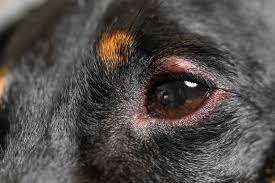Pink Eye in Dogs: Home Remedies


Pink eye, also known as conjunctivitis, is a common condition that affects dogs. It is characterized by inflammation of the conjunctiva, the thin membrane that covers the front surface of the eye and lines the inner surface of the eyelids. Pink eye can cause discomfort and irritation for your furry friend, but the good news is that there are several home remedies that can help alleviate the symptoms and promote healing. In this article, we will explore the causes, symptoms, traditional treatments, and effective home remedies for pink eye in dogs.
What is Pink Eye in Dogs?
Pink eye in dogs refers to the inflammation of the conjunctiva, which can be caused by various factors such as allergies, bacterial or viral infections, foreign objects in the eye, or environmental irritants. The condition can affect one or both eyes and is characterized by redness, swelling, discharge, and discomfort.
Causes of Pink Eye in Dogs
Pink eye in dogs can have several causes, including:
- Allergies: Dogs can be allergic to certain substances such as pollen, dust mites, or certain foods, which can trigger an allergic reaction in the eyes, leading to pink eye.
- Bacterial Infection: Bacteria, such as Staphylococcus or Streptococcus, can infect the conjunctiva and cause pink eye.
- Viral Infection: Viruses, such as the canine distemper virus, can cause viral conjunctivitis in dogs.
- Foreign Objects: Foreign objects like dust, dirt, or grass can enter the eye and cause irritation, leading to pink eye.
- Environmental Irritants: Exposure to smoke, chemicals, or other irritants can lead to conjunctivitis in dogs.
Symptoms of Pink Eye in Dogs
The symptoms of pink eye in dogs may vary depending on the underlying cause, but commonly observed signs include:
- Redness and inflammation of the conjunctiva
- Watery or thick discharge from the eye
- Swelling of the eyelids
- Excessive blinking or rubbing of the eye
- Squinting or sensitivity to light
- Discomfort or itchiness
- Changes in the color of the iris
- Crusty or matted fur around the eyes
Diagnosing Pink Eye in Dogs
If you suspect that your dog has pink eye, it is important to consult a veterinarian for an accurate diagnosis. The vet will examine your dog’s eyes, ask about the symptoms and medical history, and may perform additional tests to identify the underlying cause. These tests may include a fluorescein stain test to check for corneal ulcers or swabs to determine if bacteria or viruses are present.
Traditional Treatment for Pink Eye in Dogs
Traditional treatment for pink eye in dogs typically involves prescription medications, such as antibiotics or antiviral drugs, depending on the underlying cause. The vet may also recommend eye drops or ointments to reduce inflammation and relieve discomfort. In some cases, oral medications or systemic treatments may be necessary.
While traditional treatment is effective, some dog owners prefer to explore natural remedies or supplement the veterinary treatment with home remedies to alleviate symptoms and support the healing process.
Home Remedies for Pink Eye in Dogs
- Warm Compress: Applying a warm compress to your dog’s eyes can help reduce inflammation and soothe the irritation. Dip a clean cloth in warm water, wring out the excess, and gently place it over the affected eye for a few minutes.
- Saline Solution: Rinsing your dog’s eyes with saline can help remove discharge and debris, promoting healing. Prepare a saline solution by dissolving a teaspoon of salt in a cup of distilled water. Use a dropper or a clean cloth soaked in the solution to gently clean the eye.
- Chamomile Tea Bags: Brew a cup of chamomile tea, let it cool, and then place the tea bags on your dog’s closed eyes. The chamomile’s soothing properties can provide relief from inflammation and discomfort.
- Aloe Vera Gel: Aloe vera has anti-inflammatory and antimicrobial properties that can aid in the healing process. Apply a small amount of pure aloe vera gel to the affected eye using a clean cotton swab.
- Colloidal Silver: Colloidal silver has natural antibacterial properties and can be used as an eye rinse for dogs. Dilute a few drops of colloidal silver in distilled water and gently rinse your dog’s eyes with the solution.
- Coconut Oil: Coconut oil possesses antimicrobial properties and can help reduce inflammation. Apply a small amount of organic coconut oil around the affected eye, taking care to avoid direct contact with the eye itself.
- Apple Cider Vinegar: Apple cider vinegar has antibacterial properties and can be used as a natural eye rinse. Mix one part apple cider vinegar with three parts distilled water and gently apply the solution to your dog’s eyes.
- Green Tea: Brew a cup of green tea, let it cool, and use it as an eye rinse for your dog. Green tea contains antioxidants that can promote healing and reduce inflammation.
- Honey: Apply a small amount of raw, organic honey to the affected eye. Honey has natural antibacterial properties and can help soothe and heal the eye.
- Vitamin C: Incorporate foods rich in vitamin C, such as oranges or strawberries, into your dog’s diet. Vitamin C can boost the immune system and aid in the healing process.
Remember to consult with your veterinarian before trying any home remedies, especially if your dog’s symptoms worsen or persist.
See also: Understanding Early Stage Cherry Eye in Dogs
Preventing Pink Eye in Dogs
While pink eye in dogs can sometimes be unavoidable, there are steps you can take to reduce the risk of occurrence:
- Keep your dog’s living environment clean and free of irritants.
- Avoid exposing your dog to known allergens.
- Regularly clean your dog’s bedding and toys.
- Avoid using harsh chemicals or sprays near your dog’s face.
- Maintain your dog’s overall health through a balanced diet and regular exercise.
When to Seek Veterinary Care
While home remedies can be beneficial, it is important to know when to seek veterinary care. You should consult a veterinarian if:
- Your dog’s symptoms worsen or do not improve with home remedies.
- Your dog’s eye(s) become swollen or painful.
- There is a significant amount of discharge or mucus from the eye.
- Your dog shows signs of discomfort or changes in behavior.
A veterinarian will be able to provide a proper diagnosis and recommend appropriate treatment for your dog’s condition.
Conclusion
Pink eye in dogs can be a discomforting condition, but with the right care and treatment, it can be managed effectively. Home remedies can provide relief from symptoms and support the healing process. However, it is essential to consult with a veterinarian for a proper diagnosis and to ensure the best treatment options for your furry companion. By following preventive measures and seeking veterinary care when needed, you can help keep your dog’s eyes healthy and free from pink eye.
FAQs about Pink eye in dogs home remedies
Here are the most FAQs about the pink eye in dogs home remedies:
Can pink eye in dogs be contagious to humans?
Yes, certain types of pink eye in dogs, such as bacterial or viral conjunctivitis, can be contagious to humans. It is important to practice good hygiene and avoid direct contact with your dog’s eye discharge.
Are home remedies effective for treating pink eye in dogs?
Home remedies can be effective in alleviating symptoms and supporting the healing process of pink eye in dogs. However, it is important to consult with a veterinarian for an accurate diagnosis and to ensure the best course of treatment.
Can I use over-the-counter eye drops for my dog’s pink eye?
It is not recommended to use over-the-counter eye drops or medications without consulting a veterinarian first. Some human eye drops may contain ingredients that can be harmful to dogs. A veterinarian will prescribe appropriate medications based on the underlying cause of pink eye.
See also: Pug Eye Pop Out- What To Do 2023
How long does it take for pink eye in dogs to heal?
The healing time for pink eye in dogs can vary depending on the underlying cause, the severity of the condition, and the chosen treatment method. Mild cases may resolve within a week, while more severe cases may require a longer healing period.
Are there any natural supplements that can help prevent pink eye in dogs?
Certain natural supplements, such as omega-3 fatty acids or antioxidants, can help support overall eye health in dogs. However, it is important to consult with a veterinarian before starting any supplements to ensure they suit your dog and determine the appropriate dosage.





